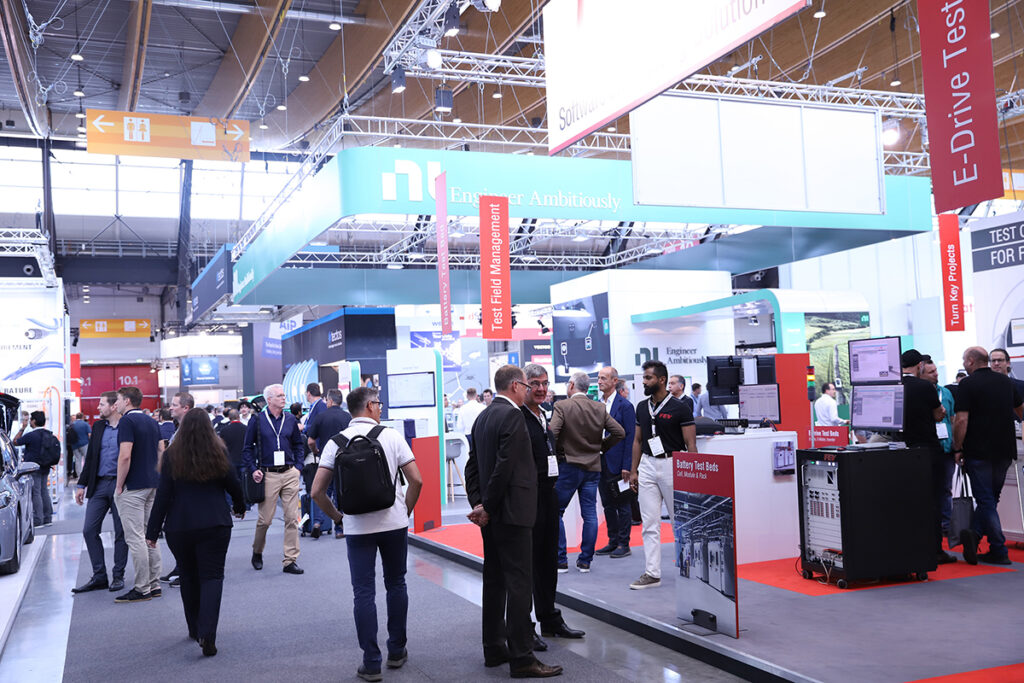Exhibitors at Automotive Testing Expo Europe are continuing to impress visitors on Day 2 of the show with new launches and cutting-edge technology across the floor. Highlights from today include the latest from UTAC, Texys Group, Monolith AI, AIM and Electro Rent.
The show is taking place now at Messe Stuttgart, Germany, and finishes tomorrow, June 23, 2022. It’s not too late to attend – register now for your free entry pass!
State-of-the-art new battery lab to open in Germany
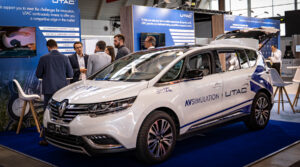 UTAC’s focus for the show is its new battery lab in Frankfurt, Germany, which is scheduled to open in November 2021. The cutting-edge facility will house two electric driveline test cells, which emulate the setup at the company’s site in California while offering higher technology and more efficiency. As demand calls, capacity can be increased; according to the supplier, it will be able to expand up to 15 cells.
UTAC’s focus for the show is its new battery lab in Frankfurt, Germany, which is scheduled to open in November 2021. The cutting-edge facility will house two electric driveline test cells, which emulate the setup at the company’s site in California while offering higher technology and more efficiency. As demand calls, capacity can be increased; according to the supplier, it will be able to expand up to 15 cells.
A whole range of e-driveline components can be analyzed at the Frankfurt facility. In terms of drives and dynos, the first two chambers will be outfitted with identical systems with full regen capability, DC battery simulators rated to 1,000kW, a maximum voltage of 1,000V and a maximum overload current of 1,200A. The dyno units in each system will comprise two AV output dynos capable of 4,500Nm maximum torque with a base speed of 1,200rpm and a maximum speed of 3,500rpm.
Alongside this, UTAC has announced that it is to establish its first center in Shanghai, China. The new 1,000m2 laboratory, which is to open in the second quarter of 2023, will be dedicated to electric driveline testing and type approval. UTAC has also revealed its plan to commission two additional battery test cells in the UK and double the number of test stands in California.
UTAC’s CEO, Laurent Benoit, said, “One year after announcing our new identity and organization, we are pleased to keep on growing and complementing our existing assets with this new laboratory in Germany. The new laboratory in Shanghai will allow us to reach the Asian markets, which are leaders in the e-powertrain. We invite customers to come to the booth and find out more.”
On display: Compact, embedded optical speed measurement for powertrain applications
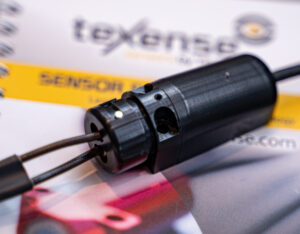 Texys Group is displaying its latest range of sensing solutions at Automotive Testing Expo Europe, including a variety of new products resulting from its acquisition of two companies – Optel and LGS – in 2020. This has resulted in the integration and development of a variety of fiber-optic speed sensing systems, the latest of which is a highly compact unit intended for embedded applications running at very high speeds. With a detection range of 1-5mm and able to operate with a switching frequency of up to 300kHz, the 152G7-E has been designed specifically for integration into operational prototypes instead of being limited to use on the test bench.
Texys Group is displaying its latest range of sensing solutions at Automotive Testing Expo Europe, including a variety of new products resulting from its acquisition of two companies – Optel and LGS – in 2020. This has resulted in the integration and development of a variety of fiber-optic speed sensing systems, the latest of which is a highly compact unit intended for embedded applications running at very high speeds. With a detection range of 1-5mm and able to operate with a switching frequency of up to 300kHz, the 152G7-E has been designed specifically for integration into operational prototypes instead of being limited to use on the test bench.
Speaking at the expo, the company’s head of business development, Ivan Tattier, explained, “This uses the same technology as our other systems but you don’t have the big potentiometer and it is auto-adjusting. We are equipping a lot of projects such as Formula 1 engines – for turbocharger speed, MGUs – with this. It is very robust and designed to be embedded.”
Another notable new offering on display from Texys is a range of instrumented bolts called TM-Fast. These enable the monitoring of fastened joints, covering fixings from M4 up to M30. The fastenings integrate a strain gauge within the head of the bolt, ensuring mechanical integrity. They can be specified with fixed wire connections, removable magnetic connections or the latest development: wireless communication. The TM-Fast bolts can also feature either an integrated signal conditioner or remote options. According to Tattier, the system was initially developed for use in heavy industrial settings. However, it has proved popular with automotive and motorsport clients, including one World Rally Championship manufacturer.
Talk to the experts behind the AI platform powering BMW crash test simulation
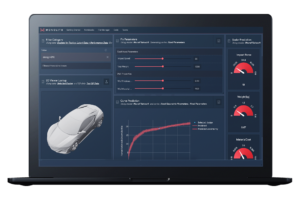 Monolith AI has announced at the expo that engineering teams at the BMW Group are using its software to accelerate their vehicle development. By training Monolith self-learning models with the company’s valuable engineering test data, BMW’s engineers are deploying Monolith’s AI to solve complex physics challenges and predict the performance of highly complex systems like crash and aerodynamics tests.
Monolith AI has announced at the expo that engineering teams at the BMW Group are using its software to accelerate their vehicle development. By training Monolith self-learning models with the company’s valuable engineering test data, BMW’s engineers are deploying Monolith’s AI to solve complex physics challenges and predict the performance of highly complex systems like crash and aerodynamics tests.
The BMW Group crash test engineering team began working with Monolith in 2019 via the BMW Startup Garage, to explore the potential of using AI to predict the force on a passenger’s tibia during a crash. Current crash development uses thousands of simulations as well as physical tests to capture performance. Even with sophisticated modeling, results require substantial engineering know-how to calibrate for real-world behavior, due to the complexity of the physics underpinning crash dynamics.
Moreover, physical crash tests can only be conducted in later stages of development when the design is mature enough to create physical prototypes. Exploring a more efficient solution, the BMW Group collaborated with Monolith to see if AI could predict crash performance and, importantly, substantially earlier in the vehicle development process. The BMW Startup Garage, BMW Group’s venture client unit, facilitated this collaboration and helped Monolith grow its business relations with the premium automotive manufacturer.
Using Monolith, BMW Group engineers built self-learning models using the wealth of their existing crash data and were able to accurately predict the force on the tibia for a range of different crash types without doing physical crashes. Moreover, the accuracy of the self-learning models will continue to improve as more data becomes available and the platform is further embedded into the engineering workflow. This game-changing approach now means engineers can optimize crash performance earlier in the design process and reduce dependence on time-intensive, costly testing while making historical data infinitely more valuable.
“When the intractable physics of a complex vehicle system means it can’t be truly solved via simulation, AI and self-learning models can fill the gap to instantly understand and predict vehicle performance. This offers engineers a tremendous new tool to do less testing and more learning from their data by reducing the number of required simulations and physical tests while critically making existing data more valuable,” said Richard Ahlfeld, the CEO and founder of Monolith. “We are excited to see how BMW Group engineers are using pioneering technologies like Monolith to reduce the cost and time of product development as they develop the next generation of premium vehicles.”
BMW Group says it is expanding its use of Monolith into more R&D engineering functions that generate vast amounts of data, from crash testing to aerodynamics, motorsport and advanced driver-assist systems (ADAS).
On display: The latest highly integrated wheel-force measurement system for motorcycles and passenger cars
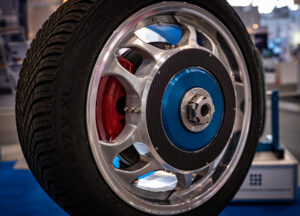 AIM Arnold Intelligente Messsysteme is using Automotive Testing Technology Expo Europe to display its latest developments for wheel-force measurement. These include an updated instrumented wheel for two-wheel vehicles and, new to the market, a unit for passenger car applications.
AIM Arnold Intelligente Messsysteme is using Automotive Testing Technology Expo Europe to display its latest developments for wheel-force measurement. These include an updated instrumented wheel for two-wheel vehicles and, new to the market, a unit for passenger car applications.
“It was a design criterion to have everything you need inside the vehicle, nothing outside,” said company founder Hans Arnold. “When we made our first [motorcycle] system for a company in Japan that already had wheel-force measurement capabilities, we saw why they wanted a new system. The existing system they had used batteries and outside telemetry, which was complicated to install. Our wheels are just mounted like a standard wheel; you plug in the power supply and a CAN logger and you can start testing.”
The setup and calibration of the wheel are also very straightforward. “There is stored calibration in the wheel and all you have to do is the zero offset for the signal via the CAN bus, and after installation, the angular offset, simply by turning the wheel to a vertical position, checking it with a spirit level and pressing a button,” explained Arnold.
A notable feature of the updated ROLSmc-HD for two-wheelers is the use of a wheel assembly made entirely from carbon fiber, used to keep the overall wheel mass the same as a standard unit despite the addition of the instrumentation in the center. Arnold noted that this is very important to ensure representative behavior from the wheel, particularly in terms of its response to high-frequency movement.
The motorcycle and passenger car (ROLS4w) units use a similar circular measuring element, consisting of five strain-gauge-based, three-component measuring elements. The 15 signals from the full-bridge strain gauges (built to the company’s specific design) are amplified and processed using a DSP integrated into the wheel center.
The ROLSmc-HD and the ROLS4w are on display at the expo, with the latter now TÜV approved and available for use in on-road vehicle tests.
Discover the power of renting high-grade electronics and electrical test equipment
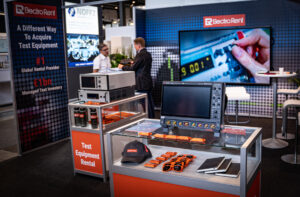 First-time exhibitor Electro Rent is showcasing its electronics and electrical test and measurement equipment rental services, which are increasingly in demand in the automotive industry. The company is using the show to create awareness of this notion and to meet new potential partners.
First-time exhibitor Electro Rent is showcasing its electronics and electrical test and measurement equipment rental services, which are increasingly in demand in the automotive industry. The company is using the show to create awareness of this notion and to meet new potential partners.
As company vice president George Acris said, “For us, the main aim is to connect with companies that aren’t familiar with our services. We offer high-end equipment that they often do not know is available for rental. Essentially, we are urging them to look at how they procure their equipment.”
Acris emphasized that rental is a flexible way for developers to procure equipment quickly and cost-effectively without any hassle. Electro Rent has considerable know-how regarding these types of instruments, with 180 test equipment experts in-house. An important part of the company’s business model is predicting and understanding the trends that demand will follow in this fluid sector of automotive development.
“The conversations we’ve had are encouraging; people have noted how great the concept is and asked us if we can provide new services. Even if it’s not our specialty, we never rule anything out and it’s great to get the feedback so we can start doing investigations. Furthermore, the expo is a good opportunity to network with other suppliers; there’s a fantastic range of companies doing great things,” concluded Acris.


